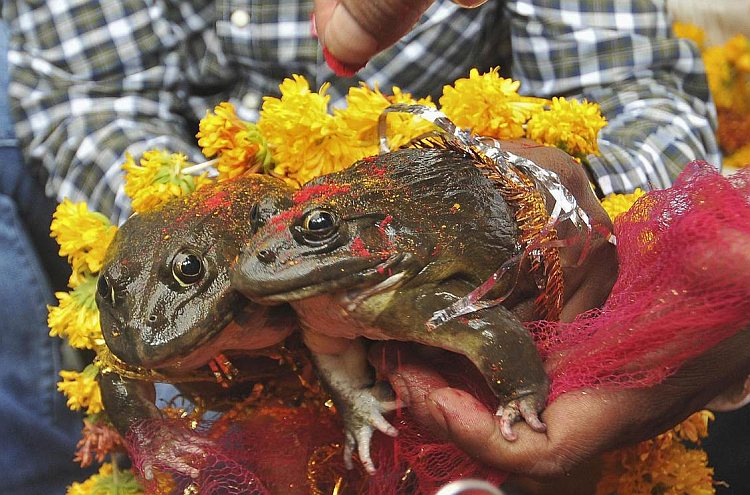In certain areas of India, specifically those which suffer from poor humidity and/or a lack of rainfall, it is traditional to find a pair of frogs, a male and a female, and marry them. I am not speaking figuratively. During a recent drought in India, pairs of frogs were brought together, dressed, made up (yes, with makeup and hairdos in some extreme cases), and then taken to an elaborate marriage ceremony performed all in the effort to bring more rainfall to the area.
Depending on where you are in the world, you may know of other ‘techniques’ to induce rainfall. In the America’s there were tribes, clans and nations of Native Americans who had special rain ‘dances’ or other ceremony to induce rainfall. In fact the Zuni are one of the Native American nations that had a rain dance and it’s interesting to note many items the shade of blue are involved in such affairs including feathers, turquoise, and other traditional dyes to further coerce the rain. In England and Europe and other parts of the world, the idea of ‘dousing’ might come to mind as a way to discover or track down sources of water. In fact, after doing some research let me quote Wikipedia:
Other hillmen try to produce rain by burning brush along the creeks, or hanging dead snakes belly-up on fences, or killing frogs and leaving them in the dry road, or putting salt on gravel bars, or suspending live turtles above the water. [..] In some localities people imagine that they can cause a rain by submerging a cat in sulphur water—they don’t drown the animal, but make sure that it is completely under water for a moment at least. I once saw this tried at Noel, Missouri, but without any success.
Quoted from Wikipedia ‘Rainmaking (Ritual)’
It’s refreshing to note that no feline fatalities were required for the methods of ‘rainmaking’. It’s not just the Americas or India either. Chinese shamans have their ways and Australian Aborigines have their own customs. So rainmaking is not as peculiar a ‘science’ as it might at first glance seem.
But this is not a story or even history of rainmaking and the societies which may have solutions. No, this story is much, much darker than that.
Recently in India, a pair of ‘mated’ frogs were forced apart. Extreme flooding had inundated the area to the point that it was becoming dangerous for the humans so the only natural thing to do was to perform a divorce ceremony, separate, and ultimately relocate the frogs.
Unfortunately, this is where the story peters out. I was unable to pull up further details on the effectiveness of the separation and divorce proceedings and more importantly, the welfare and mental health of the frogs but if I might conjecture that world news might be a good indicator of unfortunate world events, I can confidently say I’ve not heard any stories of profound flooding in India so I can only assume the separation of the frogs’ reduced the influx of water and saved lives. Though I do feel some personal empathy and sympathy for the frogs.
The more you know.
If you enjoy or hate my writings, a good way to let me know is by donation. Thanks!
